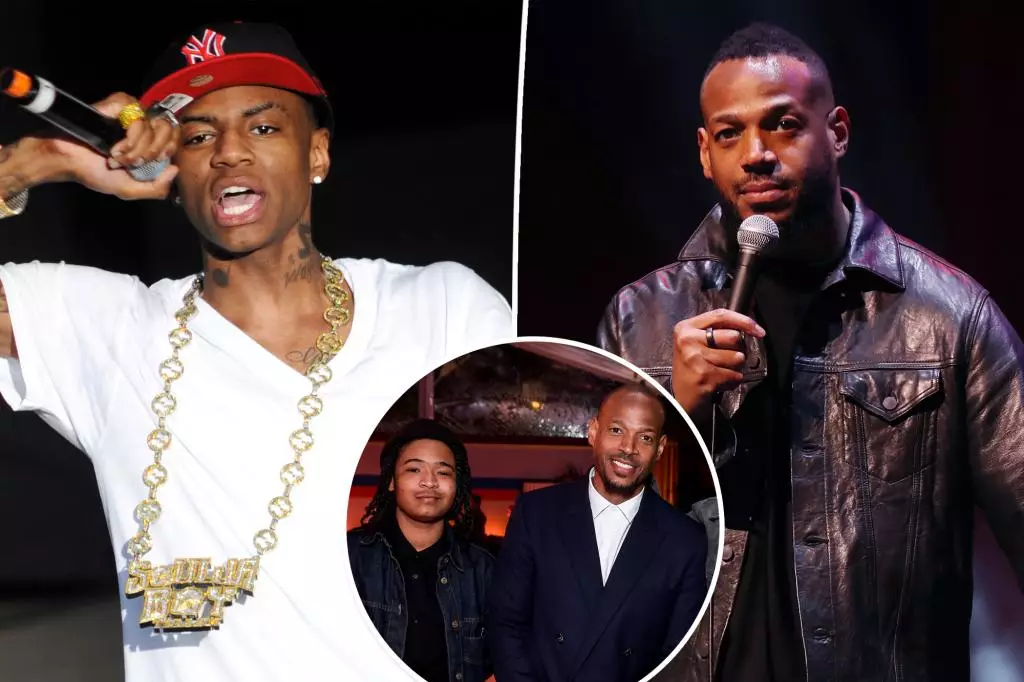The world of entertainment is rife with personal disputes that often capture the public’s interest and ignite conversations across social media platforms. One of the most recent, and perhaps contentious, rivalries is between actor Marlon Wayans and rapper Soulja Boy. The catalyst for this heated exchange seems to originate from remarks made by Soulja Boy about Wayans’ transgender son, which has led to a dramatic unfolding of insults and retorts that highlight not only their personal animosity but also broader societal issues surrounding acceptance and LGBTQ+ representation.
Marlon Wayans, famed for his roles in iconic comedies like “White Chicks,” made headlines when he revealed that his eldest child, Amai, has transitioned and now identifies as Kai. This announcement appeared on “The Breakfast Club” in November 2023, where Wayans discussed his initial difficulties in understanding his child’s choice. He emphasized his journey toward embracing unconditional love and acceptance, something that many parents may resonate with when faced with similar situations.
This depth of character and commitment to his child came under fire when Soulja Boy made derogatory comments about Kai. Wayans, however, was quick to defend his child, asserting the importance of standing against hate and ignorance. His response—a biting critique of Soulja Boy’s own dwindling career—was more than just a personal retort; it encapsulated the ongoing struggle for respect and dignity within the LGBTQ+ community.
The social media platform X has become a battleground for this feud, with both stars utilizing it to air their grievances and rebuttals. The way they chose to engage their fanbases exemplifies the role of social media in celebrity culture; it can amplify disputes, allowing for immediate public feedback and engagement. Marlon Wayans took to this digital stage to address Soulja Boy’s comments, highlighting the stark power imbalance between their careers and the noise surrounding their feud.
Wayans pointed out that if Soulja Boy were still a prominent figure in the music industry, he might face serious backlash for his inflammatory language, suggesting that relevance plays a significant part in public accountability. This commentary reflects a deeper critique of celebrity culture: the idea that individuals often operate in a vacuum where they are not held to moral standards unless their careers are on the line.
Wayans also leveraged humor, a tool he has long mastered, to navigate the vitriol hurled at him. He juxtaposed his comedic stature with Soulja Boy’s, insinuating that one cannot engage in a feud without the necessary substance and, critically, the right to leverage jokes. By minimizing Soulja Boy to mere ridiculous caricatures, such as comparing him to a “wet muppet,” Wayans employed humor as both a defensive mechanism and a means of asserting dominance in their feud.
This dynamic highlights a broader trend in celebrity feuds where humor becomes a shield—allowing for the disarmament of attacks while simultaneously keeping the audience engaged. Wayans’ approach to perceived insults transforms potential hurt into laughter, but it also raises questions about how humor is employed, sometimes at the expense of sincerity and genuine dialogue.
At its core, this feud encapsulates prevailing societal issues regarding acceptance, particularly in relation to LGBTQ+ individuals. By defending his trans son, Wayans not only stands up for his family but also represents a growing movement advocating for visibility and acceptance within the entertainment world. His fervent support, amidst the onslaught of negative comments, adds a notable voice to the chorus fighting for equality and understanding for marginalized groups.
In the end, while the back-and-forth between Wayans and Soulja Boy serves as entertainment, it also underscores larger issues of respect, representation, and the importance of personal responsibility in public discourse. Just as both entertainers have leveraged their platforms to express themselves, the audience too is invited to reflect on the underlying truths and questions these celebrity confrontations reveal.

